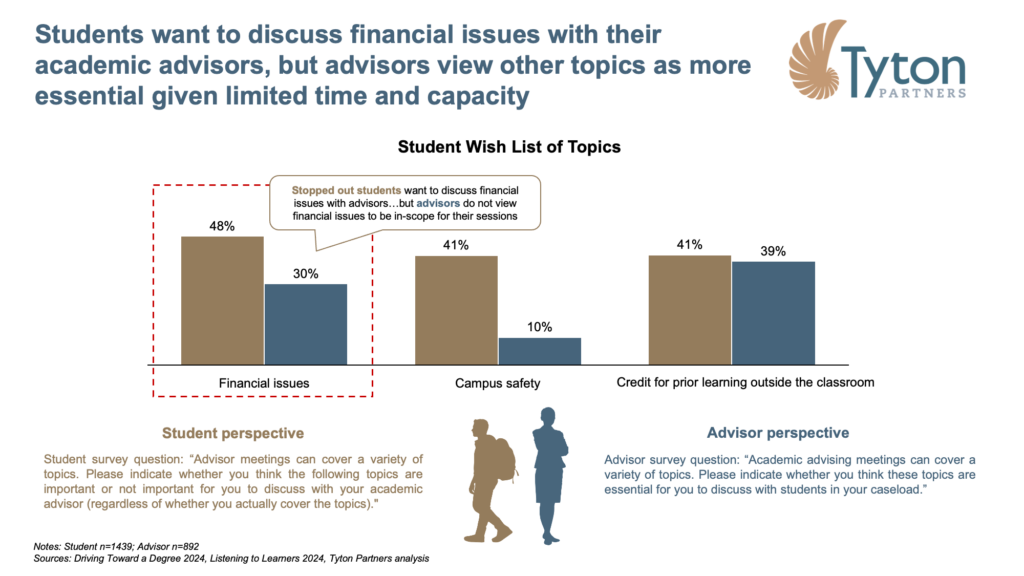Catalytic Capital: From Recognition to Action in Education-to-Workforce Investing
July 8, 2025 BlogThe education-to-workforce pipeline is under pressure – and changing fast. The World Economic Forum notes that employers around…
Every year, the post-secondary community closely watches May 1st as it marks the traditional deadline for student enrollment decisions. However, this year a day typically filled with celebration and excitement has turned somber given FAFSA chaos. Many high school seniors are still waiting for their financial aid award letters, and research from Tyton Partners shows that continuing students, particularly those of vulnerable populations, have been negatively impacted as well.
While we continue to wait with bated breath, here are some early insights from our Driving Toward a Degree and Listening to Learners 2024 surveys so you can consider more deeply how to mitigate the potential negative impact FAFSA modifications and delays may have on all students moving forward. The full publications for Time for Class 2024 will be released in June, Driving Towards a Degree 2024 in August, and Listening to Learners 2024 in September.
Listening to Learners 2024 surveyed 1,600+ students at 2- and 4-year public and private institutions during March 2024. In this research cycle, we targeted student respondents who have stopped out previously and returned to school to learn more about this important population, such as why they re-enrolled and what student support services have been most impactful. In addition, we also included questions related to the recent FAFSA delays and modifications.
Tyton asked learners who receive federal financial aid what specific impact the FAFSA delays and modifications have had on them. When reviewing responses of stopped out students and non-stopped out students, students who have previously stopped-out are two times more likely than non-stopped-out students to consider transferring to a different college or university because of the FAFSA modifications and delays. Additionally, stopped out students are more likely than non-stopped students to report waiting to re-enroll until they understand what their federal aid will be for next year.

Stopped out students who have returned to school have already overcome significant barriers to re-enrollment, and unfortunately the FAFSA delays have placed yet another hurdle in their path to credential attainment.
In Listening to Learners 2024 we asked students what topics they find to be important to discuss with their academic advisors, and in Driving Toward a Degree 2024 we asked academic advisors what topics they find essential to cover with students in their caseload. There is a mismatch between what advisors consider essential to discuss, and what students want to discuss. Academic advisors focus on core topics such as course selection, discussing progress towards graduation, and registration for the upcoming term, but students seek more holistic support and want to speak about a broad range of topics. Specifically, all learners want to discuss financial issues with their advisors, but advisors do not view financial issues to be an essential topic to cover for their sessions (rather, the focus is on course selection and registration).

Moreover, aside from advisors not considering financial matters within their purview, more than half of academic advisors lack awareness regarding the drivers and implications of FAFSA delays. Even if students raise financial concerns during advising meetings, academic advisors are unlikely to offer the necessary support. To access the required assistance students will likely have to pursue a referral or contact the financial aid office themselves, which could entail waiting for an available appointment. These additional steps create further obstacles to students receiving holistic support in a timely manner.
In Driving Toward a Degree 2024, we asked financial aid professionals what steps their institution has taken to mitigate the strain on the financial aid office related to FAFSA simplifications, delays, and modifications to aid eligibility.
Encouragingly, a third of financial aid professionals report utilizing Department of Education resources, and a quarter have modified processes to enhance efficiency. However, nearly half stated that their financial aid office has not taken any action, or that they are uncertain about the actions their office has taken. While this lack of action may stem from the expectation that FAFSA delays are a one-time occurrence, failure to address the known increased strain on financial aid offices could adversely affect students.
The FAFSA debacle highlights the urgency of issues that institutions, financial aid and student support providers and scholarship organizations must work to solve. The returning student population, especially those who have previously stopped out are not well served by the ecosystem and each actor has an opportunity in this crisis. Specifically:
In conclusion, FAFSA delays are significantly impacting students, especially those who have previously stopped out. Previously stopped out students are more likely to consider transferring and are waiting to re-enroll until they understand their federal aid for the next year. There’s a clear gap between what academic advisors consider important and what students want to discuss, with financial issues being a key concern. Many advisors are unaware of the implications of FAFSA delays, hindering students’ access to support. Moving forward, stakeholders must address these challenges to better support students, especially those from vulnerable populations. This crisis is an opportunity to improve coordination and efficiency, ensuring students have the support they need to succeed. Reach out to discuss and learn more.